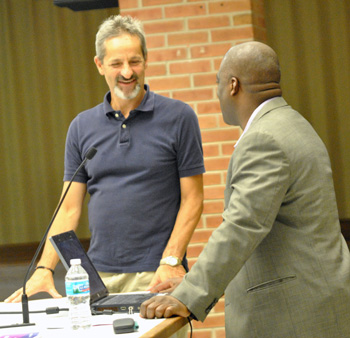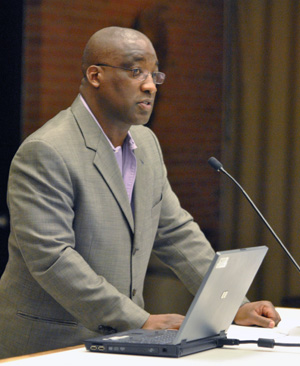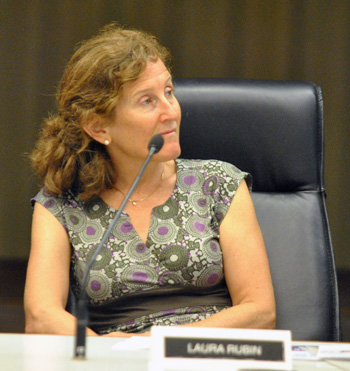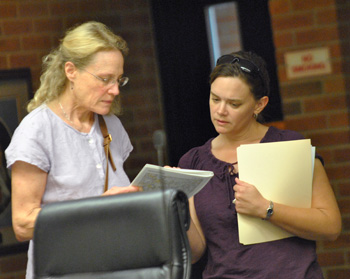Greenbelt Group Briefed on Regional Transit
Ann Arbor greenbelt advisory commission meeting (July 5, 2012): When Dan Ezekiel called the July meeting to order by noting that it was “a hot, steamy day in Tree Town,” only five of the nine commissioners were on hand. Although it was hoped that a sixth member might show up eventually, no one did.

From left: Dan Ezekiel, chair of the Ann Arbor greenbelt advisory commission, talks with Michael Ford, CEO of the Ann Arbor Transportation Authority. (Photos by the writer.)
That meant GAC did not have the six members required by the Michigan Open Meetings Act to enter into a closed session to discuss potential land acquisition, so Thursday’s meeting was much shorter than it would have otherwise been.
The main portion of the meeting included a presentation by Michael Ford, CEO of the Ann Arbor Transportation Authority. At GAC’s request, he briefed commissioners about the AATA’s efforts to develop a countywide public transit system, giving an overview similar to one he has delivered to many other government entities and community groups. The Ann Arbor greenbelt program preserves land in rural areas outside of the city limits, so commissioners were interested in hearing about how public transportation might expand there.
The meeting also included staff updates and news that two greenbelt properties have received funding from a federal grant program totaling nearly $400,000.
Countywide Transit
In addition to the AATA’s Michael Ford, the sole speaker during public commentary also addressed the issue of countywide transit.
Countywide Transit: Public Commentary
Thomas Partridge spoke during the meeting’s two opportunities for public commentary. He described himself as an advocate for the county’s disadvantaged, including senior citizens, the disabled, and people who are financially challenged and who deserve public transportation. He also noted that he was a Democratic candidate for state representative, running in District 53 (Ann Arbor). Partridge asked commissioners to integrate their land preservation efforts with providing access to these lands through public transportation, especially for employees of farms and other businesses. He said he was proud to be speaking at the same meeting with Michael Ford, CEO of the Ann Arbor Transportation Authority, and he urged commissioners to support the creation of a countywide transit system.
During his second turn at public commentary, Partridge repeated some of the same themes, and said he’s running for office to give attention to the need to reinstate state funding for local municipalities. [He was referring to the state revenue-sharing program.] It’s vitally important that state funding not only be reinstated, but also increased, he said, including funding for land preservation and parkland. He asked the commission to support that goal – not by putting an undue tax burden on the middle class, he said, but by asking that the state’s more economically “gifted” residents step up to their responsibility in a just, equitable manner and pay more taxes. Partridge also advocated for a program that would attract residents who have left Michigan, by providing services that have been too long neglected, including public transportation and affordable housing.
When Partridge concluded his remarks, GAC chair Dan Ezekiel said if Partridge makes it to Lansing, he hoped Partridge would also urge the state to reinstate the Michigan purchase-of-development-rights grant program, which hasn’t dispersed any grants in the entire time that the Ann Arbor greenbelt program has been operating. Partridge joked that he would assign Ezekiel to a task force about it. Ezekiel noted that GAC can’t endorse candidates, but offered, “good luck to you.”
Countywide Transit: Presentation
Michael Ford noted that for the past two years, AATA has been working to improve transportation services in Washtenaw County. Last year, they completed the development of a 30-year vision, he said, and since then they’ve been working on a near-term implementation of that vision, which includes setting up a broader transit authority.
Transportation is key because it impacts the economic and environmental health of our communities, Ford said. Public transit is a central transportation alternative, building an economic core and promoting compact development. It reduces the pressure on parking, and allows families to purchase fewer vehicles and have a reliable back-up, he said.
Public transit benefits the entire community, Ford said – even those people who don’t use it regularly. It helps senior citizens and people with disabilities remain independent, he said, and gives young people more transportation opportunities.
Over the past couple of years, AATA has been making improvements to its existing services, as well as adding new services, Ford said. He pointed to increased frequency of service along Washtenaw Avenue between Ann Arbor and Ypsilanti – a change that has increased ridership along that route by about 20%. NightRide and ExpressRide services have also seen ridership increases, he said. The new AirRide to Detroit Metro Airport has started making regional connections to other transportation services, Ford noted, and the new VanRide service is another way that AATA is working to increase transit options.

Michael Ford, CEO of the Ann Arbor Transportation Authority, at the July 5, 2012 Ann Arbor greenbelt advisory commission meeting.
Ford cited a recently published USA Today article, which reported that AATA was fourth in the nation, measured by ridership increase.
Ford then gave an overview of the proposed five-year transit program to increase services throughout the county. [For background on the AATA's efforts toward a broader transportation system, see Chronicle coverage: "Differences on Countywide Transit Debated"; "County Board Updated on Public Transit Plans"; "Ann Arbor Council Re-OKs Transit Docs"; and “AATA Board OKs Key Countywide Documents.” Additional information is also available on the Moving You Forward website devoted to the expanded transit effort.]
He described current services as patchy and highly dependent on the time of day and whether a rider qualifies for the service. “I know we can do better,” Ford said, adding that they’re trying to do that through outreach and engagement with communities in the county. He asked commissioners to imagine if they were senior citizens or a young person without a car – how would they get around the county now?
A plan that’s being developed would provide increased services in the county’s more compact urban areas, while providing better access to actually get to those areas, he said.
Michael Benham, a strategic planning specialist with AATA, gave some examples of how services would change. The A-Ride service for disabled riders would be expanded throughout the county, and feeder buses would be used to bring people into Ann Arbor from Dexter, Saline, Ypsilanti, Plymouth and Whitmore Lake. AATA is also proposing “very significant enhancements to the urban bus network,” Benham said – about a 50% increase in overall service hours. That includes extended routes, increased frequency on existing routes, later evening hours and weekend hours in areas that don’t currently offer that service. He noted that the plan included a lot more detail, but he understood there were time constraints to the meeting.
Ford pointed out that the core area of Ann Arbor and Ypsilanti would see more improvements in service, including more direct routes, more frequent service and extended hours, and more “demand responsive” services.
The financial plan for this effort is being refined, Ford said, with work by a financial task force that was co-chaired by Albert Berriz and Bob Guenzel. [Berriz is CEO of McKinley Inc. Guenzel is the retired Washtenaw County administrator. The task force submitted its report earlier this year. (.pdf of financial task force final report) (.pdf of financial task force subcommittee report)]
Governance is another area that’s being worked on, Ford said. A new entity would be formed with representatives from Ann Arbor and out-county areas, he said. Currently, 22 of the county’s 28 municipalities are still involved, Ford said, and as the funding and service plans are finalized, he hoped others would stay involved as well.
Ford noted that the AATA staff will attend the July 11 meeting of the Washtenaw County board of commissioners, and he hoped to get their approval for a four-party agreement – one of the next steps in creating a new, broader transit authority. [The other parties are the cities of Ann Arbor and Ypsilanti, and the AATA. All three of those entities have approved the four-party agreement and articles of incorporation for a new transit authority.]
“We’re striving to do more,” Ford said. He asked for the support and advocacy of greenbelt commissioners, and for their feedback as well. Transit can be an ally in preserving green space where appropriate, he said, and encouraging density where appropriate.
Countywide Transit: Commission Discussion
There were few questions for Ford from greenbelt commissioners. Dan Ezekiel, GAC’s chair, began by pointing out that Albert Berriz, who co-chaired the financial task force for the countywide transit plan, had been a charter member of the greenbelt advisory commission.

Laura Rubin, a member of the Ann Arbor greenbelt advisory commission, is executive director of the Huron River Watershed Council.
Laura Rubin noted that she’d seen Ford’s presentation previously, and strongly supported the effort. As the parent of a high school student, she asked about the proposal by the AATA to provide bus service to three of the Ann Arbor high schools – Huron, Pioneer and Skyline. Is this planned as a model to use in other parts of the county, or is it just on an as-needed basis at this point?
Ford replied that AATA has always collaborated with schools, and in this case the authority looked at its routes to see how AATA could accommodate transportation for high school students. That would allow the Ann Arbor Public Schools to redirect its transportation dollars to other areas, he said. Ford noted that AAPS superintendent Patricia Green has formed a task force to look at opportunities to partner on transportation. AATA is part of that, he said, and the task force is expected to make recommendations in January of 2013.
In general, AATA is always looking for ways to partner, Ford said, and “education is a big part of that.”
Ezekiel noted that the mission of the greenbelt program is to preserve open space and farmland in the periphery of Ann Arbor. There are areas where AATA’s plan and the greenbelt program’s plan “go hand in hand,” he said. The proposed countywide transit plan has been brought up in several GAC discussions, Ezekiel said, and they’re interested in seeing how it corresponds with what the greenbelt program is trying to do. He thanked Ford for coming.
Staff Updates
Ginny Trocchio, who provides staff support to the greenbelt program through the city’s contract with The Conservation Fund, gave several updates during the July 5 meeting.
The city recently received word that two potential greenbelt properties were awarded grants from the U.S. Department of Agriculture’s Farm and Ranchland Protection Program (FRPP), totaling about $400,000. The properties are:
- The Robbin Alexander Trust farm in Webster Township: About 90 acres along Northfield Church Road. It’s adjacent to the Bloomer farm, which was protected by the greenbelt program in 2005. [Tom Bloomer is currently a member of the greenbelt advisory commission.]
- The Robert Schultz farm in Superior Township: About 136 acres along Geddes and Harris roads in Superior Township. The property is located in a block of over 1,000 acres of protected farmland and open space, and is in close to the Meyer Preserve, which was purchased by the Washtenaw County parks and recreation commission in partnership with the city.
The FRPP grants will be used as matching funds in the purchase of development rights for these properties. Approval of the grant acceptances will be on the city council agenda for approval later this summer. Trocchio noted that the city had applied for FRPP grants on other properties as well, but others were not given FRPP grants.
Laura Rubin clarified with Trocchio that in fact, the city had not expected to receive any FRPP grants for these properties. That’s true, Trocchio said. The FRPP funds are awarded to individual states, which in turn give out the grants. Michigan had originally received $2.3 million in the latest round, she said, but later got an additional $800,000. A property being protected through the Washtenaw County natural areas preservation program also received a recent FRPP grant, Trocchio said, as did a property in one of the townships.

From left: Greenbelt advisory commissioner Catherine Riseng confers with Ginny Trocchio of The Conservation Fund, who provides staff support for the greenbelt program.
In other land preservation news, Trocchio reported that the county recently closed on a property owned by J.A. Bloch & Co., a land development firm based in Southfield. The purchase was made in partnership with the Ann Arbor greenbelt program. [The 33-acre site in Northfield Township is on the north side of Joy Road east of US-23 and west of Gleaner Hall Road, adjacent to the county's Northfield Woods Preserve. The purchase had been discussed at the county parks and recreation commission's May 8, 2012 meeting.]
Trocchio also told commissioners that the Ann Arbor city council, at its July 2 meeting, had confirmed the appointment of Archer Christian as the newest GAC member. [Christian had attended GAC's June 7 meeting to introduce herself. She replaces Mike Garfield, who was term limited. Christian is development director at the Ann Arbor-based Ecology Center, where Garfield serves as director.]
Trocchio also noted that plans are being made for a bus tour of the greenbelt on Sept. 22. More details will be announced when plans are finalized, she said.
Finally, Trocchio told commissioners that it’s unclear if enough GAC members will be in town for the Aug. 2 meeting, so she’ll keep them informed on the need to either cancel or reschedule the meeting.
Present: Shannon Brines, Dan Ezekiel, Catherine Riseng, Liz Rother, Laura Rubin. Also: Ginny Trocchio.
Absent: Peter Allen, Tom Bloomer, Archer Christian, Carsten Hohnke.
Next regular meeting: It’s possible that the August meeting will be canceled. If held, it will be on Thursday, Aug. 2, 2012 at 4:30 p.m. in the second-floor council chambers at city hall, 301 E. Huron St., Ann Arbor. [confirm date]
The Chronicle survives in part through regular voluntary subscriptions to support our coverage of publicly-funded entities like the city’s greenbelt program. If you’re already supporting The Chronicle, please encourage your friends, neighbors and coworkers to do the same. Click this link for details: Subscribe to The Chronicle.



